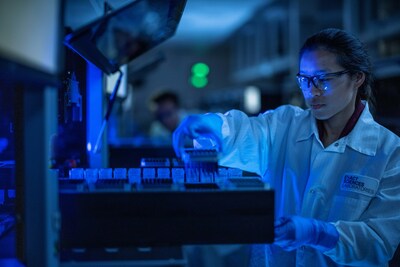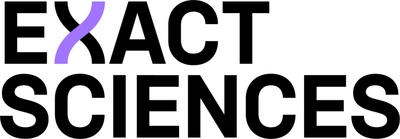Next-generation Cologuard Test Demonstrates 94 Percent Sensitivity for Colorectal Cancer at 91 Percent Specificity, Raising the Bar in Non-invasive Screening
- Next-generation Cologuard demonstrated a 30% lower false positive rate compared to the FDA registrational trial for Cologuard.
- The BLUE-C study showed improved cancer sensitivity, specificity, and precancer sensitivity for next-generation Cologuard.
- The study included 20,000 participants, reflecting the racial and ethnic diversity of the U.S.
- Exact Sciences plans to complete FDA submission for next-generation Cologuard by the end of 2023.
- None.
Insights
Analyzing...
BLUE-C study met all endpoints, showing improved cancer sensitivity, specificity, and precancer sensitivity
20,000-participant study reflects racial and ethnic diversity of the
Company plans to complete FDA submission for next-generation Cologuard by end of 2023
Cologuard in | Next-gen Cologuard | |
Specificity | 87 | 91 |
Specificity | 90 | 93 |
Cancer sensitivity | 92 | 94 |
High-grade dysplasia sensitivity | 69 | 75 |
Advanced precancer sensitivity | 42 | 43 |
Note: specificity including non-advanced findings includes colonoscopy results that were negative for cancer or advanced precancer upon histopathological review; specificity including no findings includes no findings on colonoscopy and no histopathological review; high-grade dysplasia includes carcinoma in situ and stage 0 cancer |
"Cologuard is a groundbreaking innovation in non-invasive cancer detection. Next-generation Cologuard will set a new performance standard," said Kevin Conroy, chairman and CEO of Exact Sciences. "We are harnessing deep scientific insights, advanced technology, and over a decade of research and development to detect colorectal cancer with greater sensitivity and significantly improve the false positive rate. Once approved, next-generation Cologuard will meaningfully enhance the patient experience, and it comes at a critical time – when there are 60 million Americans not up to date with screening."
About the BLUE-C Study
BLUE-C is a multi-center, prospective study (NCT04144738) of more than 20,000 adults 40 years of age and older. The trial was designed to evaluate the performance of next-generation Cologuard (multi-target stool DNA or mt-sDNA). Using colonoscopy as a reference method, the robust study design directly compares multiple screening tests, including next-generation Cologuard and a fecal immunochemical test (FIT). Blood samples were also collected for later evaluation of a blood-based screening test being developed by Exact Sciences. BLUE-C is one of the largest colorectal cancer screening trials ever conducted, and the study population reflects the racial and ethnic makeup of
"Accurate and early detection of colorectal cancer and precancerous lesions is critical for reducing incidence and preventing deaths from this disease," said Thomas F. Imperiale, MD, Professor of Medicine at the Indiana University School of Medicine, research scientist at the Regenstrief Institute, and principal investigator for BLUE-C. "The results from this large study of a representative population provide affirmation that Exact Sciences continues at the forefront of non-invasive screening. These new results suggest improved performance of an mt-sDNA test, strengthening the case for molecular stool-based testing."
About Next-generation Cologuard
Developed in partnership with Mayo Clinic, next-generation Cologuard features novel biomarkers and improved laboratory processes. It also incorporates enhanced sample stability components to provide patients more time to return their sample to Exact Sciences' lab and increase the valid result rate.
Cologuard revolutionized colorectal cancer screening by providing a convenient and accurate testing option for those at average risk. Nearly a decade later, Cologuard has been used to screen for colorectal cancer more than 12 million times.
In the coming months, Exact Sciences plans to release additional analyses of the BLUE-C data and complete its application to the FDA for approval of next-generation Cologuard.
About Cologuard
Results from Exact Sciences' prospective, 90-site, point-in-time, 10,000-patient pivotal trial, DeeP-C, were published in the New England Journal of Medicine in March 2014. The Cologuard test is included in the American Cancer Society's (2018) colorectal cancer screening guidelines and the recommendations of the
The Cologuard test result should be interpreted with caution. A positive test result does not confirm the presence of cancer. Patients with a positive test result should be referred for colonoscopy. A negative test result does not confirm the absence of cancer. Patients with a negative test result should discuss with their doctor when they need to be tested again. Medicare and most major insurers cover the Cologuard test. For more information about the Cologuard test, visit cologuardtest.com. Rx only.
About Exact Sciences Corp.
A leading provider of cancer screening and diagnostic tests, Exact Sciences gives patients and health care professionals the clarity needed to take life-changing action earlier. Building on the success of the Cologuard® and Oncotype® tests, Exact Sciences is investing in its pipeline to develop innovative solutions for use before, during, and after a cancer diagnosis. For more information, visit ExactSciences.com, follow Exact Sciences on Twitter @ExactSciences, or find Exact Sciences on LinkedIn and Facebook.
NOTE: Oncotype is a registered trademark of Genomic Health, Inc. Exact Sciences and Cologuard are trademarks or registered trademarks of Exact Sciences Corporation.
Forward-Looking Statements
This news release contains forward-looking statements concerning our expectations, anticipations, intentions, beliefs, or strategies regarding the future. These forward-looking statements are based on assumptions that we have made as of the date hereof and are subject to known and unknown risks and uncertainties that could cause actual results, conditions and events to differ materially from those anticipated. Therefore, you should not place undue reliance on forward-looking statements. Examples of forward-looking statements include, among others, statements we make regarding the development and commercialization of the next-generation Cologuard test; the performance characteristics of next-generation Cologuard in a commercial setting; and the timing and anticipated results of additional analysis of the BLUE-C data and FDA submission. Risks and uncertainties that may affect our forward-looking statements are described in the Risk Factors sections of our most recent Annual Report on Form 10-K and any subsequent Quarterly Reports on Form 10-Q, and in our other reports filed with the Securities and Exchange Commission. We undertake no obligation to publicly update any forward-looking statement, whether written or oral, that may be made from time to time, whether as a result of new information, future developments or otherwise.
References
1. Imperiale TF et al., N Engl J Med (2014)
2. Exact Sciences internal data
Contacts
Media (
Media (OUS): Federico Maiardi, +41 79-138-1326, fmaiardi@exactsciences.com
Investors: Megan Jones, +1 608-535-8815, meganjones@exactsciences.com
![]() View original content to download multimedia:https://www.prnewswire.com/news-releases/next-generation-cologuard-test-demonstrates-94-percent-sensitivity-for-colorectal-cancer-at-91-percent-specificity-raising-the-bar-in-non-invasive-screening-301855721.html
View original content to download multimedia:https://www.prnewswire.com/news-releases/next-generation-cologuard-test-demonstrates-94-percent-sensitivity-for-colorectal-cancer-at-91-percent-specificity-raising-the-bar-in-non-invasive-screening-301855721.html
SOURCE Exact Sciences Corporation









